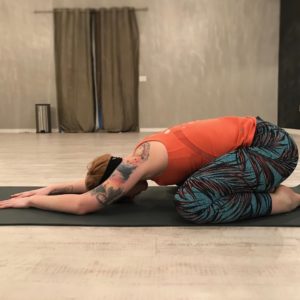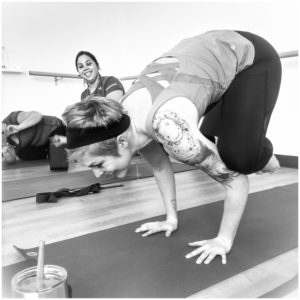By Vera Minot

(how I feel about running, most days)
When I arrived in Waco in 2013 I had no idea that my cross-country upheaval would catalyze an entire health and wellness journey for me. I began researching nutrition and preparing my meals at home, and to complement this I began working out in a gym (for a while), and I even (gasp! This part was hard) started running again. I was training for my first 5k (a big deal for me!), with bigger dreams to come, when I was hit by a car on my way home for lunch one day. As I began nursing several spinal injuries, I came to find I could no longer walk for extended periods of time without debilitating pain, let alone run. Facing potentially lifelong demobilizing injuries, I ceased my workout routines, further increasing the wellness void I had been looking to fill since arriving in Waco. I needed to find an activity that would honor my injuries, aid in my healing process, and give me the physical outlet I yearned for, I turned to that in which I had only dabbled in the past: yoga.
I started practicing yoga consistently in June of 2016, and I found that when I did my back pain decreased! Despite there being limitations to the poses (or asanas) I could perform due to my injuries, as the weeks went on I noticed I was gaining some strength in my arms, core, back, etc. Yoga seemed to be the perfect solution for what I was seeking! What I didn’t realize yet was that physical benefits are only a small part of what yoga has to offer to any one person. My journey may have begun as one of physical health, but after 7 short months I can see that while the physical benefits are many and varying, the mental health benefits greatly exceed any expectations I didn’t even know I should have.

(child’s pose, or balasana, a common resting/healing pose)
I’ve been an anxious person for as long as I can remember—I’m very self aware, so I mull over past events looking for cues for how I can better myself (“oh gosh, I didn’t ask her enough questions about herself! I need to make sure to do that more, I hope she didn’t think I was egotistical?!”), and when I’m not doing that I’m often considering the various [typically disastrous] ways a near-future event may pan out (“ok, maybe I’ll invite her for a hang out next week and I’ll make sure to ask her what she likes to cook and focus on her, but what if she thinks I’m prying? Maybe a hangout next week is too soon?”). Long story short, living in the present hasn’t always been easy for me, and unfortunately anxiety resides and thrives when I focus on the past and the future. This is where yoga comes in.
Since beginning my practice, not only have the frequency and intensity of my anxious moments decreased drastically (I realize anxiety manifests differently for everyone and as such it’s very much an umbrella term), but I’ve noticed more specific benefits to my mental health as well. Naturally, there’s the obvious increase in endorphins that happens with any exercise. There’s also the incredible sense of pride and accomplishment I feel when I make progress with an asana I wasn’t able to perform before. Perhaps most importantly though, I have increased concentration and focusing abilities (especially when it comes to doing tasks I didn’t really want to do, like vacuuming my house and going to work 🙂 ), I find that I am able to stop, breathe, think, and then act as opposed to charging forward with my conditioned, emotional reactions, and best of all my tolerance for stress and stressful situations has increased significantly!
A personal example of these benefits presented itself recently when I had to have some tough conversations with a good friend of mine. Our friendship had gone awry, and as you can imagine the conversations that can ensue around a situation like this tend to be very emotionally charged. Both of us were upset, and in that moment I would rather have been anywhere other than on her couch, talking about whether this friendship was worth continuing. In the past I probably would have written an impassioned letter, detailing every wrong, every hurt, regardless of its necessity, and then run away so I wouldn’t have to see the fallout. Present “me” was able to sit through the “awkward” silences in the conversation that night, stay true to my needs and boundaries, and respect my friend despite the incendiary nature of some of the accusations being hurled my way. We weren’t able to resolve our issues, but I was able to move forward with a sense of calm acceptance I know would have been foreign to me even 2 years ago. I credit yoga 100% for arming me with the skills to handle that situation.

(this is me doing Bakasana, or Crow’s Pose, one of the first times I was able to successfully do it! Still working on the form of course)
The benefits to my mental health since beginning my consistent practice have been so great that naturally I began to wonder why. I’m by no means a voice of authority on the scientific relationship between yoga and mental health, but here’s what I’ve found—it all seems to come down to the same couple things. BKS Iyengar, the esteemed founder of Iyengar Yoga, said “Penetration of our mind is our goal, but in the beginning to set things in motion, there is no substitute for sweat.” What we practice physiologically develops new habits and reconditions old ones that affect us mentally. When we breathe through a difficult pose, breathing deeper into the muscle or joint that’s struggling, we learn how to endure a stressful situation. When we focus on keeping our inhales and exhales even and slow to regulate our heartbeat, this keeps us in the present moment (being in the present moment is also called mindfulness)—this in turn quiets our mind, which is key in increasing concentration and focus. Mindfulness is grounding, and neurologically this helps train the brain to stay in executive thinking mode (this is where the stop, breathe, think, then act happens) as opposed to the more primal fight/flight/freeze mode. When we are practicing our balance, we are attuning to our body, making the tiny adjustments necessary to stay in a pose. Learning to attune to my body has helped me recognize the physiological precursors to stress and anxiety so that I can deal with them with a calm mind and heart as opposed to letting them overtake me.

(Kim and her daughter in the studio foyer, photo credit Sarah Hill Photography)
There are some yogis and yoginis out there who learn these lessons on their own, in their home practice. I, however, benefit greatly from a teacher’s guidance, so I’m so grateful that Yoga8 exists here in Waco. I’ve experienced all the studios in town, but when it comes down to it the feeling of love and acceptance for who I am and where I am in my journey that I feel at Yoga8 is unparalleled elsewhere, in my opinion. Kim, the owner of the studio, has a beautiful spirit as well as an incredible knowledge of the human body and its capabilities, and all of the other RYT-200 certified teachers at the studio truly take to heart Kim’s mission when she opened Yoga8 two years ago. Their mission is to improve as many lives as possible.
My short time with Yoga 8 has truly revitalized me. My time spent in their myriad classes, from the restorative Healing classes to their sweatier Kick-UR-Asana classes (and any of the classes in between) has taught me how to attune to/regulate my body and be mindful whether my toes are on the mat or not. The lessons I’ve learned and will continue to learn as I progress in my yoga journey have dramatically increased my mental health, and as such improved my life. To Kim, I can say: mission accomplished.
 Vera Minot is a reluctant adult from Arizona trying to navigate life in Waco and in this world. She finds joy in cooking, gardening, her cats, social justice, creative endeavors, books, and of course yoga.
Vera Minot is a reluctant adult from Arizona trying to navigate life in Waco and in this world. She finds joy in cooking, gardening, her cats, social justice, creative endeavors, books, and of course yoga.
